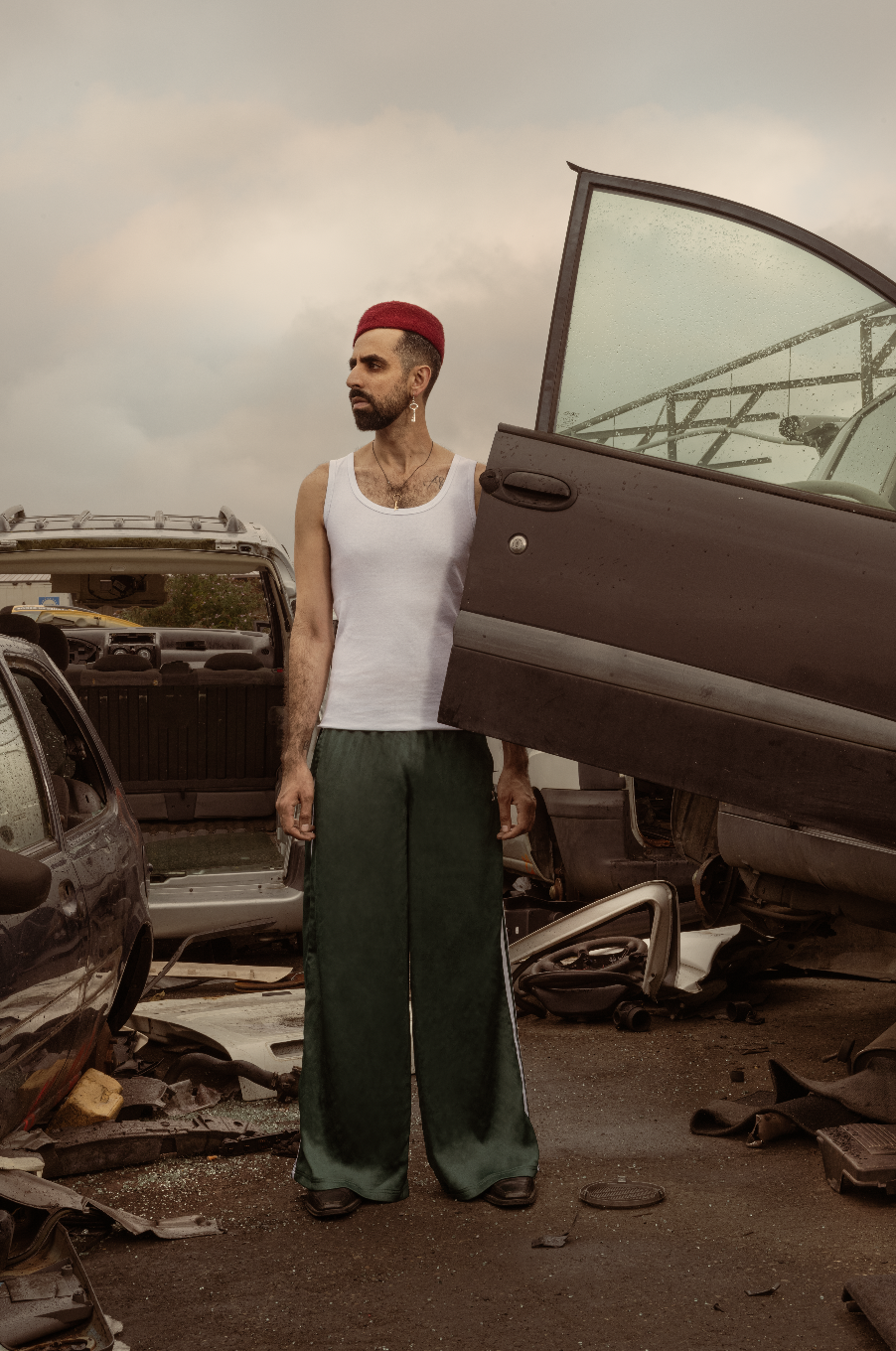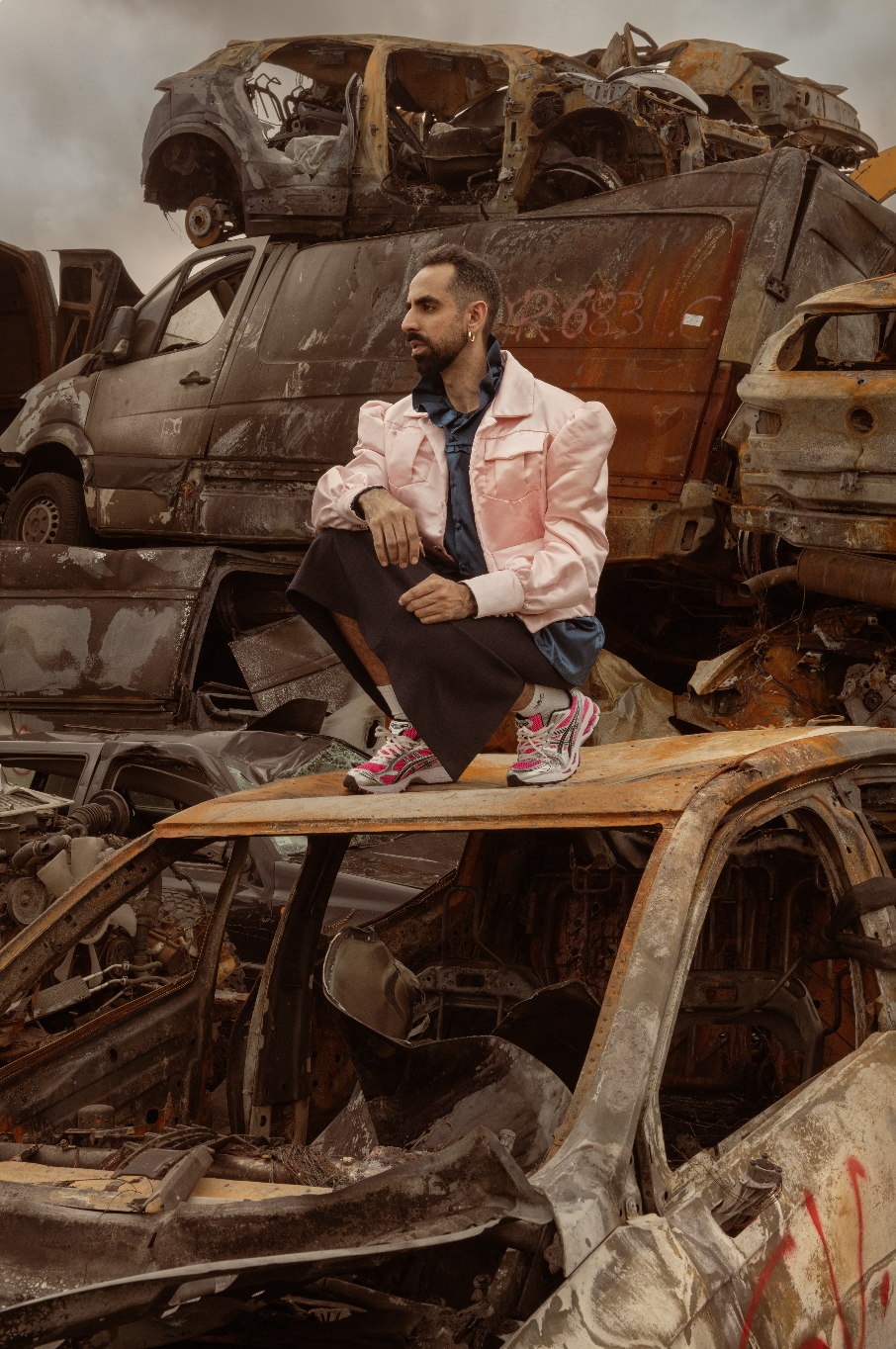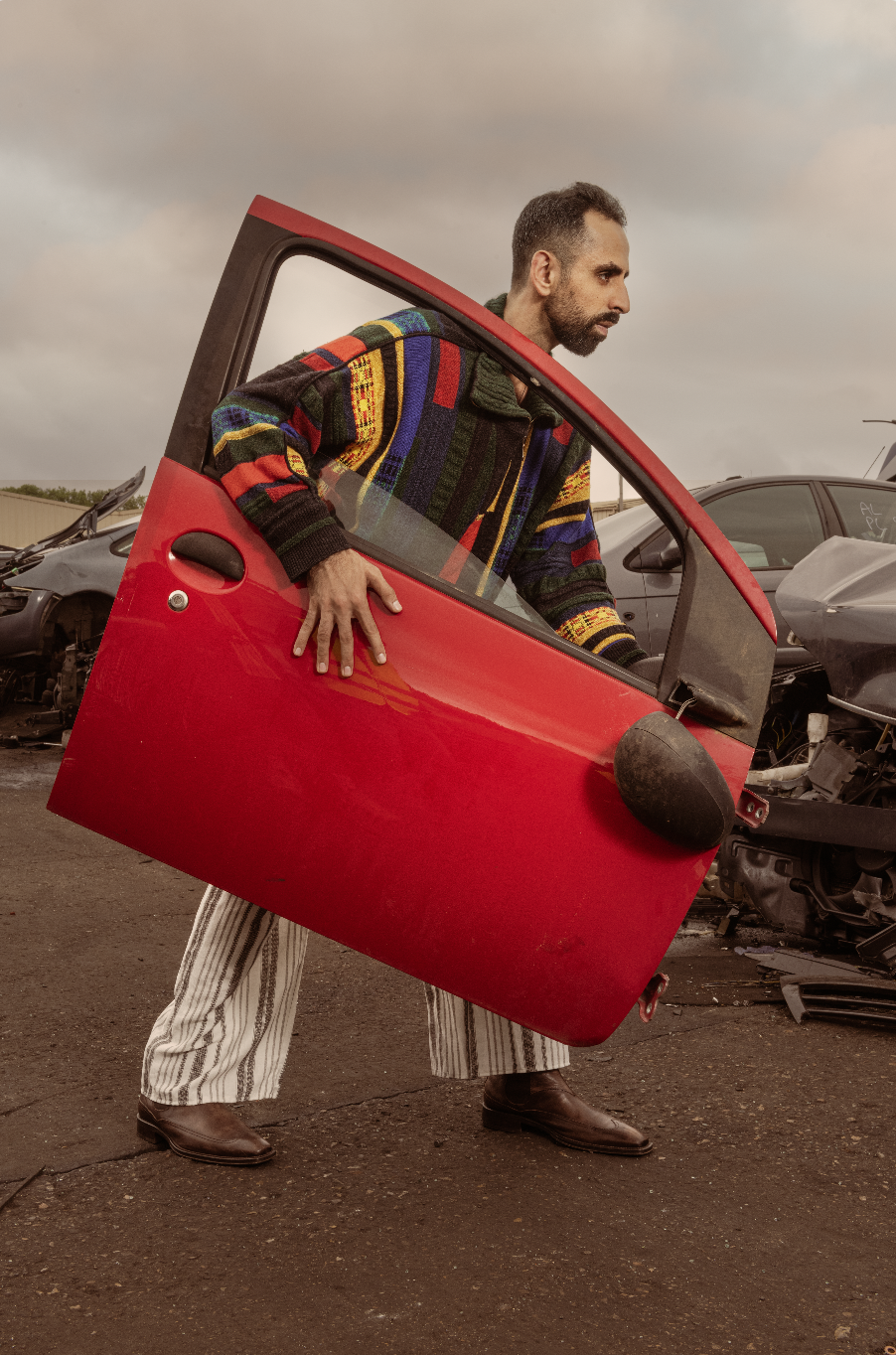The Many Lives of Bashar Murad
Photography by Fred Leveugle at D&D MGMT
Artistic Direction by Benjamin Daugeard at D&D MGMT
Interview by Meredith Damouni
Few artists can move as fluidly between genres, languages, and geographies as Bashar Murad—and fewer still carry the kind of cultural and political inheritance he does. Born in Jerusalem, the Palestinian singer, songwriter, and visual creator is part provocateur, part poet, part pop visionary. His world—cinematic, subversive, and deeply emotional—is a tapestry of identity, resistance, and self-expression stitched together through rhythm, fashion, and film.
As the ceasefire in Gaza takes form, it seems the perfect time to celebrate such a unique talent that has emerged from the region.
In 2024, Bashar’s name ricocheted across Europe when his song Wild West—an intoxicating mix of pop, politics, and unapologetic style—took Iceland’s Eurovision contest by storm. It wasn’t just a performance; it was a statement. Clad in cowboy fringe and confidence, Bashar redefined what it means to be a Palestinian artist on a global stage, turning a song about freedom and duality into an anthem of presence. For a world often accustomed to seeing Palestinians only through headlines of conflict, here was something else—a voice that refused to be simplified.
“Art became an act of survival. Music wasn’t just entertainment—it was the only space where freedom existed.”
To understand Bashar Murad is to understand the music that raised him. His father, Saeed Murad, founded Sabrin, one of the most influential bands to emerge from the Palestinian music scene. “They were the first to modernize our sound,” Bashar recalls. “They took folk melodies and merged them with jazz, reggae, rock—it was revolutionary.” Growing up in East Jerusalem, his home doubled as a recording studio, rehearsal space, and gathering point for artists and activists. It was a house filled with instruments, protest songs, and stories—but also checkpoints, curfews, and constant reminders of the occupation. “Art became an act of survival,” Bashar says. “Music wasn’t just entertainment—it was the only space where freedom existed.” From those formative years, Bashar inherited more than talent; he inherited a mission. His music, whether playful or piercing, is never detached from the social fabric that shaped him. Every synth, lyric, and visual choice feels like a conversation between history and possibility.
Before Wild West, Bashar was already known for his electrifying visuals and boundary-pushing narratives. Songs like Shillet Hamal, Yalalalli, and Everyone’s Getting Married blurred lines between the personal and political—challenging social norms around masculinity, love, and gender roles in the Arab world. “I don’t sit down and think, ‘Let me be political,’” he says. “But when your existence is political, your art will reflect that.” His music videos, often self-directed, are layered with camp aesthetics, satire, and symbolism—a nod to both Arabic pop icons and global queer performance art. In Everyone’s Getting Married, he wears a bridal gown while lamenting societal pressure; in Yalalalli, he retreats into shadows, a haunting metaphor for hiding one’s truth under occupation. “I grew up loving visual worlds—from Madonna to Björk to Fairuz. Each of them created universes around their sound. I wanted to do that, but through a Palestinian lens.”
When the Icelandic band Hatari performed in Tel Aviv in 2019, they made headlines for displaying the Palestinian flag live on stage—a rare and defiant gesture. “That moment changed everything,” Bashar remembers. “We connected right after. They came to Jerusalem, we wrote a song together—mixing Arabic and Icelandic—and it just clicked.” That collaboration planted the seed for Bashar’s Eurovision debut. “I’ve always been fascinated by Eurovision,” he laughs. “My dad once tried to launch a Palestinian Eurovision back in 2007—can you imagine? That’s how I first learned about it.” By 2023, Bashar was ready. “I thought, why not compete in Iceland? The only conditions were that the semi-final performance had to be in Icelandic, and three-quarters of the songwriters had to be Icelandic.” He teamed up with Einar Stefánsson, Hatari’s drummer, and the result was Wild West.
But then came October 7th—and the context changed overnight. “Suddenly, I wasn’t just a contestant. I was a Palestinian artist on one of Europe’s biggest stages, during a time of unimaginable pain for my people. It became so much bigger than me.” Wild West became a mirror for contradiction—a song about freedom born out of constraint. “I wanted to show that being Palestinian isn’t only about suffering. We’re also joy, humor, creativity. I didn’t want to be reduced.” Despite finishing in second place, Bashar sees it as a victory. “I had the most votes until the final duel,” he grins. “Poetic, right? Losing a duel with a song called Wild West. But it felt like a win—for representation, for voice, for visibility.”
When I meet Bashar over a zoom call, he was in Paris, in the middle of a creative residency—writing, reflecting, and planning his next moves. “Being here gives me a strange kind of freedom,” he admits. “I can breathe, create, experiment. But it’s also bittersweet. I feel guilty sometimes—like I’ve escaped while others can’t.” He mentions a poem by Rifat Al Harayri, a Gazan poet killed in 2023: “If I must die, you must live to tell my story.” Bashar pauses. “That line... it haunts me. I think that’s what being an artist means right now. To witness. To keep memory alive.”
What makes Bashar’s songwriting extraordinary is its duality. His lyrics are deeply personal yet universally resonant. “Even when I write about love or heartbreak, there’s always a Palestinian layer,” he says. “You can’t separate the two.” His creative process changes depending on the collaborator. “When I’m alone, it starts at the piano. I sit, improvise, and words come. But with Einar, it’s all about rhythm—he brings beats, I bring melody. We recently sampled a Sabrin track for our new song ‘Stone.’ It’s like bridging generations.” That interplay between old and new defines Bashar’s work. He’s not trying to Westernize Arabic music, nor is he romanticizing nostalgia. Instead, he builds bridges—fusing scales, textures, and languages into something utterly contemporary.
In today’s pop landscape, visuals are as important as the sound. Bashar knows this instinctively. He’s directed most of his videos, choreographed his performances, and even styled his own shoots. “Visuals help people step into my world,” he says. “Wild West could’ve been just another song—but through the visuals, it became a reimagining of freedom, queerness, and identity.” His style is maximalist but meaningful—glitter meets grit, drama meets depth. “I love fashion that tells stories. Sometimes it’s armor; sometimes it’s a disguise. I use it to blur gender, to provoke, to reclaim space.” That fashion sensibility has made him a muse for emerging designers and photographers. In Paris, he’s already been tapped for several collaborations that merge couture with cultural commentary.
“When your existence is political, your art will reflect that.”
Being a Palestinian artist in the global spotlight is as exhilarating as it is exhausting. “I know every word I say will be dissected,” Bashar admits. “But I also know how powerful representation is. For so long, Palestinians have been seen through others’ eyes. Now, we’re telling our own stories.” He recalls receiving messages from fans across the Arab world—queer teens, Arab diasporas, and even Icelandic fans who’d never heard a word of Arabic before Wild West. “That’s what art does—it breaks barriers without permission.” Still, he’s careful not to let politics define him. “I’m not just a symbol. I’m an artist. I make pop music, I dance, I fall in love, I cry. My existence shouldn’t need justification.”
When I ask about TikTok, Bashar laughs. “That’s how you found me!” He’s right. Clips from his performances went viral—not just for the music, but for the charisma. “TikTok is a wild world,” he says. “But it’s also powerful. It’s where young people discover art now.” He’s been using the platform to share behind-the-scenes moments, spontaneous covers, and reflections from Paris. “It’s direct. There’s no filter, no middleman. Just you and your audience.”
Bashar’s debut album, Wild West, is slated for release later this year—a collection of songs that trace the emotional map of a young artist navigating chaos and creation. “It’s a mix of languages, genres, and emotions. Some songs are pure pop, others are intimate piano ballads. But they’re all honest.” Until then, he plans to release singles throughout the year. “People consume music differently now. They want stories in fragments—quick, continuous. I’m fine with that. Each song is a chapter.”
As our conversation winds down, Bashar returns to what grounds him—community. “My dad used to say, ‘Music is the bridge between what is and what should be.’ That’s how I see my work. I’m not trying to fix everything—I’m trying to connect.” He smiles when I ask what he’s listening to right now. “A mix of everything—Fairuz in the morning, Rosalía at night. And sometimes, silence. That’s when I write.”
“Maybe legacy isn’t about fame or awards. Maybe it’s about telling our stories before someone else tells them for us.”
There’s something almost cinematic about Bashar Murad’s trajectory—a pop star born out of resistance, a poet armed with sequins instead of slogans. He’s not just making music; he’s preserving memory. Every performance, lyric, and costume is a form of documentation—of existence, defiance, and dream. “I think a lot about legacy,” he says quietly. “What does it mean to be remembered? Maybe it’s not about fame or awards. Maybe it’s about telling our stories before someone else tells them for us.” And with that, he smiles—the kind of smile that belongs to someone who knows the power of being seen, heard, and understood.
Bashar Murad is currently based in Paris. Follow him on Instagram and TikTok for updates.
BASHAR 101
Current base: Paris
Born: Jerusalem
Occupation: Singer, songwriter, visual artist
Upcoming release: Wild West (album, 2025)
First musical memory: Listening to Sabrin rehearsals in his living room
Style in three words: Defiant, poetic, fearless
Dream collaboration: “Björk — always.”
Morning soundtrack: “Fairuz. Always Fairuz.”
Evening soundtrack: “Rosalía — for power.”
Hidden talent: “I cook really well when I’m anxious.”
Life motto: “Storytelling is resistance.”






